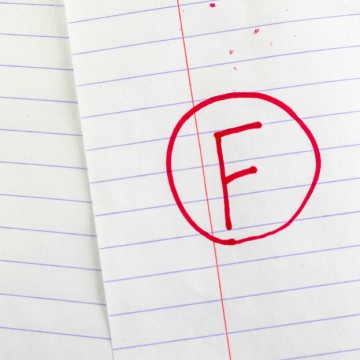Teachers, How to Deal With Failing Students
Tuesday, November 11, 2014

Photo Credit: iStock
When teachers look at a list of their failing students, they can react one of two ways. They will either look at the grades and blame the students for not producing or they will look inward and ask what could be done better on the teaching end of things. This may not sound like a great divide, but it is. A teacher’s entire philosophy can be understood just by looking at their response to a failing student.
I have worked with many teachers who have their curriculum and will stick to it regardless of results. They will say, “It worked fine in 1998 so I know it’s good. It’s proven.” These are teachers who generally stay away from reflection. They are generally subject first and student last. These teachers usually don’t evolve. These are the teachers who feel like they have it all figured out. They start most sentences with, “Kids today…” and they aren’t very pleasant to spend time with.
I had an associate principal a couple years ago who printed out everyone’s F rates for each class they taught. He then distributed them to each teacher and then within departments, we asked each other why so many or so few kids failed. It was difficult discussion for sure because we had to own our numbers. My English department got through the process and emerged as better teachers because we knew that we could have more of an impact on lowering our F rates than we previously thought. Another department went the opposite route and made fun and ridiculed a teacher who had low F rates for not being challenging enough. That department still has an inflated number of students failing to this day. They don’t get it and they probably won’t.
When looking at a student who is failing and questioning one’s own methods, a teacher is reflecting on their process and evaluating themselves. It is incredibly healthy and positive. It can also be difficult. I fall under this category. When I have a student who fails my class I take it personally and I make sure that I did everything in my power to help that student succeed. Because of this, I have been accused by co-workers of “dumbing down my curriculum” or “not preparing them for the real world” which is a load of crap. I’m trying to help my students succeed. I don’t give the failing students an out; I provide them with interventions and support. I make them believe in themselves. Succeeding in a difficult class and overcoming a early F grade can be a powerful moment. And so can failing a class.
There is teacher who teaches an Advanced Placement class and when results came back this summer, his students had terrible results. It is helpful to use that data to inform yourself about your classroom practices and evaluate yourself to see what should stay and what should go in your teaching for the next year. At least that’s what I thought. This teacher saw his results and blamed the students. “Kids today just don’t work like they used to,” was his first comment. His response this year is to just add more homework. Anyone want to bet how his students do on the AP test this year??
Teaching in a high poverty school has shown me that there are many obstacles to overcome for these students. They enter school in the first grade with roughly only 20% of the vocabulary of a student who was born into an affluent family. It doesn’t get easier. The biggest problem these kids have is that they don’t believe they can succeed. In fact, many of them don’t even know what success looks like. Success might be staying out of prison or staying alive until summer. For many of them, their teachers are the only people they know with a college degree. The teachers who stick to their same teaching ways and take zero notice of just why their students are failing just aren’t serving their classes. It is our responsibility to do our very best that every student succeeds. We have to meet them somewhere on the learning continuum. Not by “dumbing down” our lessons, but by making them believe in themselves and creating exciting lessons that will invigorate each and every student.
In a high school setting I have students miss school all the time because they have to stay home to provide child care for younger siblings. Or who miss weeks at a time to work to put food on the table. Or just can’t get to school because they’re homeless and have no way to get a ride. There are so many things that can cause a student to not be 100% at school. Teachers need to at least take a look at this. We need to accept that real life can get in the way of school sometimes.
I am lucky enough to have very few students actually fail my class. Many teachers say it’s because my class is easy but I know it’s because I make student success a priority. My students work their tails off; I just try to make them want to.
Ben Jatos is in his 21st year of teaching secondary English. His opinions are his own and in no way represent the views of his school district. He is passionate about his family, the Portland Trail Blazers, the writing of Raymond Carver, and educating young people. For more of his opinions and reviews of literature for the classroom, check out his blog at www.benjatos.com.




 Delivered Free Every
Delivered Free Every
Follow us on Pinterest Google + Facebook Twitter See It Read It